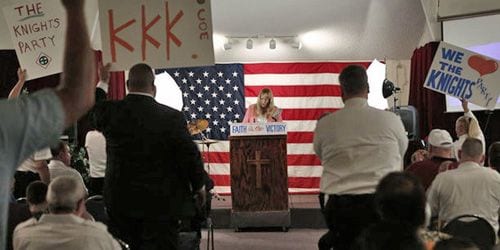
“The reality is the Klan is all about hate. It’s like they live in opposite world, [with] the idea that somehow the Klan is this great organization.” Mark Potok, a senior fellow at the Southern Poverty Law Center, sums up an idea that many people would say is obvious. The Ku Klux Klan is an “opposite world”, premised on hate and hopelessly outdated, too.
Still, as we learn in Discovery Channel’s one-hour special, KKK: Beneath the Hood, current Klan members see themselves quite differently. They also see themselves growing in number: the organization now boasts 30 chapters currently active in the United States. The one-hour special, airing 20 March, provides fascinating and rare insight into the Klan through interviews and outings with members of the organization like Traditionalist American Knights member Richard Bondira and Frank Ancona, that group’s Imperial Wizard. It also features, to a lesser extent, a few activists who have dedicated their lives to working against the KKK, such as Mark Potok or Concordia Sentinel editor Stanley Nelson. While Bondira dismisses what he deems “fictionalized” accounts of the Klan’s history, outsiders to the Klan are quick to recall its violent past and remind us that it is still invested in racism and other bigotries.
The program’s focus on Klan members narrows further as it interviews members of two specific groups, The Traditionalist American Knights of the Ku Klux Klan and The Knights Party (led by Thomas Robb). While the former group at least attempts to mask their prejudice, the Knights Party isn’t so quiet about their feelings about people who aren’t white. Robb’s 12-year-old grandson Andrew Pendergraft has had his own web series titled “The Andrew Show, A Show for White Kids!” for over two years. In it he discusses everything from interracial dating (which he calls “wrong and sick”) to gun rights (“Don’t let anyone tell you guns are bad, because cops have guns and they are good”). While many adult groups use children to spread their message, it’s yet upsetting to watch a child who still has trouble pronouncing his R’s express his disgust over interracial couples in the cartoons he watches.
Members of the Traditionalist American Knights prefer a less caustic approach to explaining their beliefs. Frank Ancona insists they are not racist, but still believe that white people should not mix with other races: “You’re not supposed to hate nobody because of what race they are, of what color their skin is. God created each species after its kind and he saw it was good, you know, and you’ve got different types of birds like crows, sparrows… They stay within their own kind. But they’re all birds, you know. So that’s kind of our view on it.” We might notice that Ancona ignores the fact that some animals of the same species do indeed breed within different types; it’s hard not to wonder whether a walk through a local animal shelter might enlighten him.
The program doesn’t comment specifically on such interviews, but we can’t help but question what we hear. One instance is particularly jarring. Despite KKK members’ insistence that they want their organization to be accepted and more favorably represented by mainstream media — Ancona states that he “would like to see the Klan come back to the former glory it once had back in the 1920s” — they do carry on with one terrifying ritual that will never be popular, even among the most ardent reality TV fans: cross-burning. Rachel Pendergraft (young Andrew’s mother) insists that this is nothing more than a religious ceremony, that the fire is the holy fire of Christ, and that they feel closer to God waving burning sticks while they wear white robes, looking like deranged fraternity brothers.
When the program shows a cross burning performed by the current Traditionalist American Knights members, the scene is almost laughable at first, especially when the people involved in the ritual botch the chant by not speaking in unison. However, once the cross begins to burn, it’s a formidable sight reminiscent of a time when racism was widely accepted in the States.
Unfortunately for the Ku Klux Klan, but not surprisingly, KKK: Beneath the Hood doesn’t effectively challenge the organization’s frightening, hateful image in popular culture. What the show does do, however, is provide an unpleasant jolt of reality, as we’re reminded that the KKK is still alive and well. This even as at least one Klansman worries about its prospects: “Does the Klan have a future?” Bondira asks, “I don’t think they stand a dog’s chance in hell, to tell you the truth.” While the other members don’t voice the same opinion as Bondira, we can only hope he’s right.

![Call for Papers: All Things Reconsidered [MUSIC] May-August 2024](https://www.popmatters.com/wp-content/uploads/2024/04/all-things-reconsidered-call-music-may-2024-720x380.jpg)



